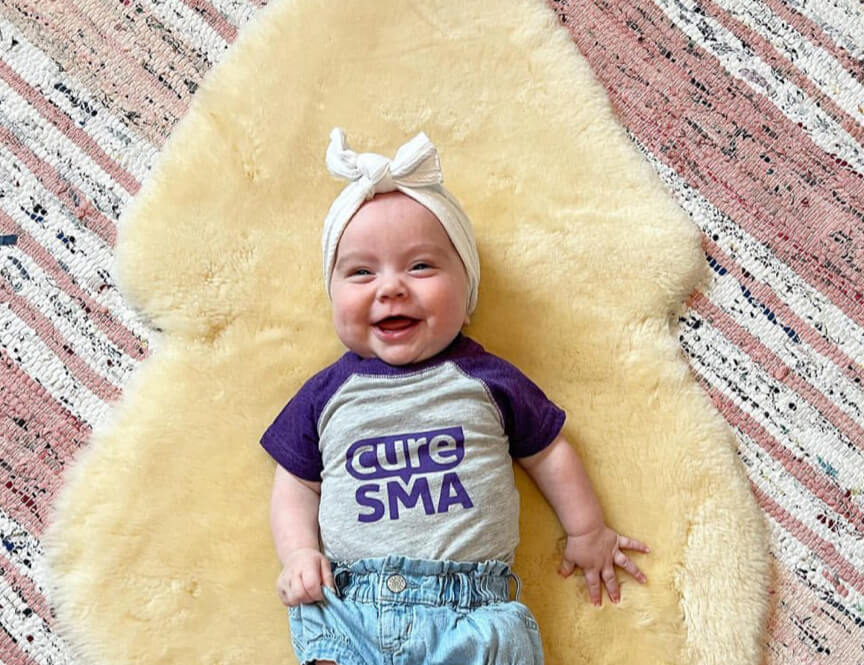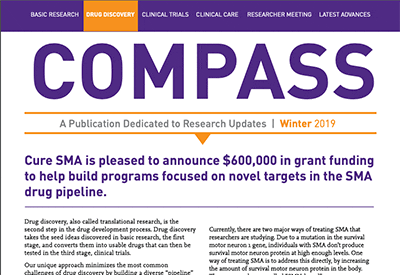Over our past fiscal year—from July 1, 2017, to June 30, 2018—Cure SMA has funded over $5 million in new research funding. This funding will be used strategically to help accelerate research, and ensure we are developing treatments for all types, ages, and stages of SMA. The areas funded include:
- Basic research, with a particular focus on funding approaches to develop combination therapies.
- Drug discovery, to convert basic research ideas into practical new drug candidates.
- Clinical and regulatory research, to facilitate clinical trials for all types and stages of SMA, and to guide safe and effective drug candidates toward regulatory approval.
- Clinical care, to understand issues like breathing and nutrition that impact current quality of life for those affected by SMA.
- 22nd Annual SMA Researcher Meeting, to bring the leading SMA scientists, clinicians, and drug developers together to develop SMA research strategies.
If you missed any of our funding announcements, catch up on them in our news section at www.cureSMA.org/news. Each announcement includes a profile of the researcher who is receiving the grant and explains more about their projects and how they might benefit the SMA community.
Basic and Translational Research
$1,175,000 in New Funding in FY18:
- $150,000 to Charlotte Sumner, MD, for Testing the potential of SMN-AS1 as a therapeutic target in SMA
- $150,000 to Allison Ebert, PhD, for The role of astrocyte-produced miR-146a in SMA pathology
- $75,000 to Robert Kalb, MD, for Effects of diminished SMN on segmental spinal cord innervation of motor neurons
- $50,000 to Rashmi Kothary, PhD, for The shifting landscape of SMA research: towards a better understanding for a role for SMN in aging
- $150,000 to Umrao Monani, PhD, for SMA modulators as a means to revealing disease mechanisms
- $150,000 to Robin Parks, PhD, for Serum-derived exosomes as a biomarker for Spinal Muscular Atrophy
- $150,000 to Brunhilde Wirth, PhD, for Study of combinatorial therapy based on SPINRAZA together with a novel protective genetic modifier
- $150,000 to Kathryn Swoboda, MD, for Clinical and pathologic correlations in patients with early infantile-onset SMA
- $150,000 to Bakri Elsheikh, MD, for Determine the motor unit response following SMN restoration in late-onset spinal muscular atrophy
Ten Ongoing Projects in FY18:
- Arthur Burghes, PhD, for Identification of SMA modifiers and deletion/duplication junctions in the SMA region, Ohio State University -Jocelyn Côté, PhD, for Investigating the Mechanism by Which SMN Regulates Translation: Identification of Novel Therapeutic Targets, University of Ottawa, Canada
- Christine DiDonato, PhD, for Skeletal muscle activators as potential modulators of muscular weakness in SMA, Lurie Children’s Hospital of Chicago
- Oliver Gruss, PhD, and Utz Fischer, PhD, for Regulatory cues modulating the activity of SMN in human cells, Rheinische Friedrich-Wilhelms-Universitat Bonn and Julius-Maximilians-Universitat Wurzburg, Germany
- Alberto Kornblihtt, PhD, for Epigenetics in SMN2 E7 Alternative Splicing, Universidad de Buenos Aires, Argentina
- Jean Giacomotto, PhD, for Zebrafish models of Spinal Muscular Atrophy optimized for chemical genetics and drug discovery. From proof-of-principle to new insights and treatments, University of Queensland, Australia
- Chris Lorson, PhD, for Examining the role of astrocytes and the influence upon lower motor neuron susceptibility in SMA, University of Missouri
- Yong-Chao Ma, PhD, for Regulation of Motor Neuron Defects by Cdk5 Signaling in SMA, Lurie Children’s Hospital of Chicago
- Stephen J Kolb, MD, PhD, for Arrested Development or Neurodegeneration? An approach to understand developmental motor neuron pathology in SMA, Ohio State University
- Remy Bordonne, PhD, for Skeletal muscle activators as potential modulators of muscular weakness in SMA
Drug Discovery
$600,000 in New Funding in FY18:
- $300,000 to Kevin Hodgetts, PhD, for Pre-Clinical Development of LDN-5178 for the Treatment of SMA
- $300,000 to Umrao Monani, PhD, for Restoring function at the NMJ: A novel means to treat SMA
Two Ongoing Projects in FY18:
- Preclinical development of a JNK drug candidate to alter disease progression in SMA to Charlotte Sumner, MD, Johns Hopkins Hospital and Imago Pharmaceuticals, Maryland
- Pharmacological inhibition of p38αMAPK as a candidate therapeutic approach for SMA Livio Pellizzoni, PhD, Columbia University, New York
Clinical and Regulatory Research
As more SMA drug programs progress through clinical trials, there is an increasing need for us to address clinical and regulatory issues and bring the patient voice and information on clinical meaningfulness into the drug development and approval process. Funding for this area has been granted through The SMA Industry Collaboration, and is being directed toward several critical projects:
– Publishing a Voice of the Patient Report for SMA documenting key learnings from a Patient Focused Drug Development Meeting held in April 2017 to better define clinical meaningfulness, across all ages and stages of SMA , along with the results of research on the Benefit-Risk Preferences of parents/caregivers and individuals affected with SMA.
- Developing Pediatric patient reported outcome measure to ensure that SMA clinical trials are measuring the results most important to those affected by SMA, from infancy to late adulthood. $150,000 Grant Awarded to Dr. Heatwole, March 2018
- Increasing clinical trials’ site capacity, while optimizing trial trial readiness across SMA Clinical Trial Centers in the US. Over the past year, Cure SMA developed a clinical trial readiness program, including an SMA Clinical Trials’ Toolkit to help equip clinical trial staff to increase access to trials by increasing the number of sites that are able to participate.
- Educating and engaging physicians, caregivers and patients to decrease time to SMA diagnosis. This year, Cure SMA Launched a national awareness campaign targeted to both parents and health care professionals, with the goal of reducing the length of the SMA “diagnostic odyssey”: Launched November 2018
- Central to the effort is a new, easy-to-use website that encourages parents to trust their instincts if they suspect a motor delay. Through this site, parents improve their understanding of the early signs of motor delays, via instructional videos, downloadable symptom checklist to share with their doctor to help address their concerns.
- Along with take-action resources for parents, there is a special section dedicated to healthcare professionals detailing current diagnostic criteria, educational resources, as well as the latest treatment options and protocols.
- $500,000 in grants to increase capacity at 13 SMA treatment centers across the U.S., facilitating access to treatment and care.
- Creating a Newborn Screening Treatment Algorithm Working Group comprised of clinical experts in SMA to develop a treatment algorithm for infants diagnosed with SMA through NBS.
- SMA was added to the Federal Recommended Uniform Screening Panel for newborn screening in July 2018
Clinical Care
This year, Cure SMA launched the SMA Care Center Network, a collection of specialized clinics across the nation that will help ensure that all those living with spinal muscular atrophy (SMA) are able to receive high-quality, multidisciplinary care. The SMA Care Center Network is a diverse set of hospitals that share clinical data on SMA patients by connecting their electronic medical records to our registry. This will allow us to investigate the impact treatments and care have on SMA, create benchmarks, establish evidence-based SMA care, and certify centers of excellence in the future.
By connecting SMA Care Centers to one another and utilizing a united registry to collect data, healthcare providers, including neurologists, pulmonologists, physical and occupational therapies, nutritionists, orthopedists, and others will be able to work together to provide complete and comprehensive treatment. Because SMA is a medically complex disease, these clinical teams must take a multi-faceted approach to treat SMA, and Cure SMA is taking a multi-faceted approach to improve care, as well.
Over the next three years, Cure SMA will invest $9.1 million in the development of the SMA Care Center Network with the goal of creating an evidence-based standard of care to improve the lives of people with SMA.
Cure SMA also provided community physical and occupational therapists the opportunity to gain more knowledge and experience by working with a therapist mentor directly in a clinical setting. Twelve mentee-mentor pairs completed the program this year.
Clinical Care Meeting
Over 180 clinicians from around the work representing 14 disciplines and 11 specialties gathered at the inaugural Cure SMA Clinical Care Meeting during the 2018 Annual SMA Conference. Clinicians participated in an SMA Standard of Care panel discussion and a panel discussion on implementation of new treatment clinical programs. 52 abstracts were also presented. The 2019 Clinical Care Meeting will expand to a full day.
SMA Researcher Meeting
The 2018 international SMA Researcher meeting is the largest Spinal Muscular Atrophy research conference in the world. Over 500 researchers attended the 2018 Meeting, representing over 100 institutions, 35 biotech and pharmaceutical companies, and 19 countries worldwide. Over 130 research presentations were given as well



